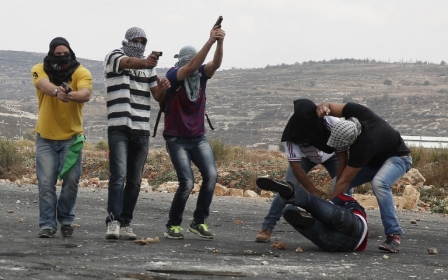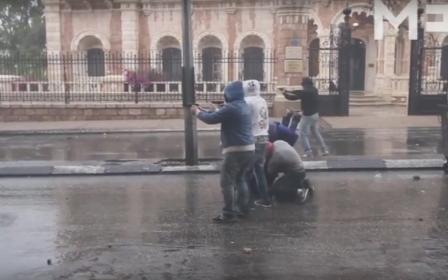Violence can't stop Bethlehem's Christmas message of peace: Mayor

BETHLEHEM, West Bank - The city of Bethlehem usually comes alive during the Christmas season. Holiday lights line the city’s roads, nightly concerts take over the main square and vendors selling hot chocolate, spiced sahlab and warm corn are scattered throughout the city-center.
The spirit of Christmas is usually a palpable force in the city. However, this year most residents agree that they do not feel there is much to celebrate.
Since the start of October, the occupied Palestinian territories and Israel has been overtaken by an onslaught of violence many are referring to as a new Intifada. At least 125 Palestinians have been shot dead by Israeli forces and settlers during the period, while 19 Israelis have been killed by individual Palestinian attackers.
Neighbourhoods across the occupied West Bank and East Jerusalem have been blockaded by Israeli forces, freedom of movement strictly regulated and clashes between Palestinian youth and Israeli forces have become a daily occurrence.
Out of respect for the recently dead, referred to as “the martyred” by Bethlehem’s residents, festivities have been toned down significantly. The lighting of the Christmas tree, a yearly spectacle in Bethlehem, was a quiet one. Instead of colourful fireworks, sending out loud booming explosions of light, the city rang bells to commemorate the ceremony.
Concerts have been cancelled, and decorations around the city brought down to a minimum. Instead of a wide variety of colours wrapped around the towering Christmas tree outside the Nativity Church, the tree was decorated only in red, white, green and black - the national colours of Palestine.
The famed tree now stands with the Palestinian flag flying high from the treetop, sending the message that nationalism will be at the centre of this year’s Christmas.
All of the changes come from orders directed by Bethlehem’s mayor, Vera Baboun.
Baboun, the first female mayor of Bethlehem, has made it clear that while the city will celebrate Christmas, it will do so with a heavy heart.
“Usually Christmas in Bethlehem is a celebration of the rebirth of the message of peace, of hope and love, from a city that sends peace to the whole world, and yet it does not live in peace,” Baboun told Middle East Eye. “On the ground we suffer, and this most recent upheaval affects the children and youth the most.”
Baboun and her office have been planning a variety of Christmas celebrations for months. Having taken office in 2012, this year is not the first Christmas in Bethlehem to be planned during a period of mourning.
Another year, another crisis
Last year Christmas came as the people of Gaza were suffering the bitter cold of December in cities turned to rubble. While Israel’s 2014 Gaza offensive ended in August, over 2,200 people had been killed in the 50-day war, and the effects on the enclave were devastating.
On top of that, tourism was down, with foreigners nervous to travel to the region after images of bombings and bloodshed had so recently taken over media coming out of the territories.
This year however, Baboun’s job of balancing a celebration while still respecting the cultural tradition of remaining sombre during a time of loss is particularly difficult.
In just under two months, Bethlehem lost a 13-year-old boy, and a promising young professional to Israeli fire during clashes. The deaths prompted city-wide “strikes,” which saw business and all other facilities close for 24 hours out of respect for the dead. The wounds of those lost are still fresh in the minds and hearts of the community.
In Palestinian tradition, like many cultures in the Middle East, weddings, birthdays and other celebrations are cancelled for months after a loved one passes, or during times of great loss and war.
Baboun said the city’s decision to go forth with a toned-down celebration, however muted, was a matter of principle.
“This abnormal way of living definitely affects our celebrations of Christmas, yet we all agreed in the city, whether Christian or Muslim, that the Christmas celebration is our right,” Baboun said. “We give a message of peace to the whole world and in no possible manner can the Israeli occupation occupy the joy of our right to celebrate and have our feasts.”
The celebrations however, have not had a calming effect on the clashes in the city, which erupt several times a week, inundating the local public hospital with young people suffering from gunshot wounds.
When asked if she would call for calm in the city for the Christmas season if she thought she was able to carry out the call, the mayor quickly said no.
“No one has the right to stop this, no one has the right," Baboun said, referring to the clashes in the city as well as the greater uprising of the Palestinian people. “I cannot tell these children to stop what they are doing because it is Christmas. Those who have lost their lives in these clashes are a part of this Christmas as well.”
Securing Christmas
While the emotional and cultural barriers were navigated in planning Christmas in Bethlehem this year, more practical steps had to be taken as well, in regards to security.
For the first time, security played a major role during the tree lighting ceremony. Streets leading up to the square were barricaded and manned with police officers, metal detectors installed at pedestrian entrances, and the local scout groups were asked to put on uniforms and help patrol the festivities.
Baboun insisted that the increased security was not because Bethlehem is dangerous, “Bethlehem is a safe city,” Baboun said. “You can walk all throughout the city, [it] is secured by its citizens.”
However, there are new and growing threats to the Christian population in the occupied Palestinian territories that have become more apparent during this time of upheaval in particular.
On Monday, right-wing Jewish extremist leader Benzie Gopstien called Christians “blood-sucking vampires” whose mission is to either kill or convert Jews, Israeli daily Haaretz reported.
“Christmas has no place in the Holy Land,” he reportedly wrote in an article. “Let us remove the vampires before they once again drink our blood.”
With most of the Palestinian attacks against Israelis having been on the settler population, tensions between Israelis living in illegal settlements in the occupied West Bank are at an all time high.
While not all illegal settlements are hotbeds of extremism, the extremist settler groups, which have threatened Palestinian Christians and carried out a number of arson attacks against churches, generally base themselves in illegal West Bank settlements.
Since the start of October there are have been multiple reports of confrontations between Palestinian protesters and Israeli settlers on the outskirts of the city and within the greater Bethlehem district.
Economic hits
Tourists it seems, have also been concerned with security. A little less than two months before the most recent bout of upheaval erupted, the Palestinian Authority’s Ministry of Tourism, based in Bethlehem, told MEE that tourism in the city had declined around 30 percent from the yearly average due to last year’s war as well as instability in the greater Middle East.
As the newfound upheaval that started in October continues well into the month of December, tourists are more hesitant than ever about making a trip to the holy land.
“The Christmas season is meant to be a season of economic prosperity,” Baboun said. “When we talk about a decrease in occupancy in our hotels, we are talking about citizens as well. We are talking about the restaurants, the hotels, the vegetable markets, the meat sellers, we talk about it full circle, and whenever the occupancy [and tourism] is reduced, the economy and people’s livelihoods are also reduced and we are highly affected.”
Exact numbers on how many tourists Bethlehem will lose out on this Christmas season are not yet known, but the figure is expected to be significant.
Paying for the Christmas celebrations that were not cancelled in the city was also part of the economic struggle. Baboun said all of the festivities, including lights and decorations in the city were made possible by local businesses stepping up as donors, despite being in the middle of a period of economic stress.
“Despite the unemployment, and high poverty rates, despite the closures in Bethlehem, and the war in Gaza, and scarce job opportunities, local donors insisted that we needed to light the tree and have a joyful season in the city, so we did it all together,” Baboun explained.
While Baboun said she is focused on making sure everything runs smoothly in the city, she hopes the world is watching more than just the Christmas celebrations in Bethlehem this year.
“Each one of us has a heart and a mind, eyes and ears to hear and to feel and see,” Baboun said. “It’s a matter of how you use the knowledge to create a change. I want to show our reality to the whole world and to say to them that as long as the city of peace - the city of Bethlehem - is walled, peace is walled.”
Stay informed with MEE's newsletters
Sign up to get the latest alerts, insights and analysis, starting with Turkey Unpacked
Middle East Eye delivers independent and unrivalled coverage and analysis of the Middle East, North Africa and beyond. To learn more about republishing this content and the associated fees, please fill out this form. More about MEE can be found here.






